#israeli lives matter
Text






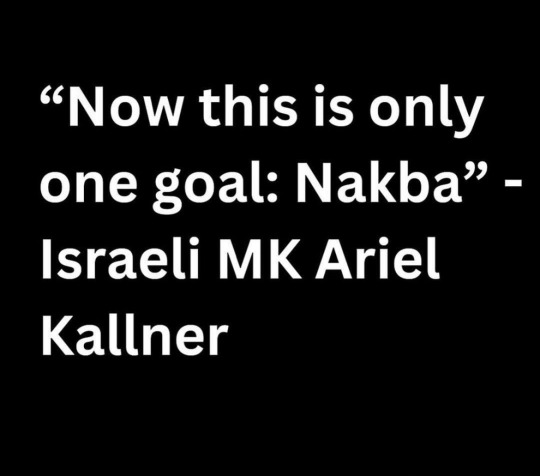
It is a genocide.
#palestine#gaza strip#israel#from the river to the sea palestine will be free#gaza#gaza genocide#news on gaza#free gaza#gazaunderattack#save gaza#am yisrael chai#am israel hai#free israel#i stand with israel#israeli lives matter#jumblr#jews against genocide#jews of tumblr#secular jew#jews against israel#jewblr#jewish history#jewish#jerusalem#hamas is isis
73 notes
·
View notes
Note
It's getting sad now seeing you picking fights or inserting yourself in them to get attention, and you're still lonely and ignored by people you're trying to curry favor with. It didn't help that people were warning others to block you, in and out of fandoms.
Or maybe because despite how you guys proclaim how progressive you are you guys come off as self-righteous sociopaths who marginalize those who don't fit your definition of good. You guys say that fundies are toxic, but act as bad as them. Seriously, you guys fear people due to fearmongering propaganda you spread amongster each other. And ironically for people who say Nazi punchers you guys are spreading some of the worst anti-semitism in years yet you guys lack any self-awareness to notice the effect. Also I am doing this because I truly believe you guys are anti-semitic and toxic and making a good amount of Jews unsafe.
#ooc post#israel#i stand with israel#pro-israel#pro israel#anti-zionism is anti-semitism#zionism#pro-zionism#israel is legitimate#israel isn't an aparthied#jewish lives matter#Israeli lives matter
9 notes
·
View notes
Text
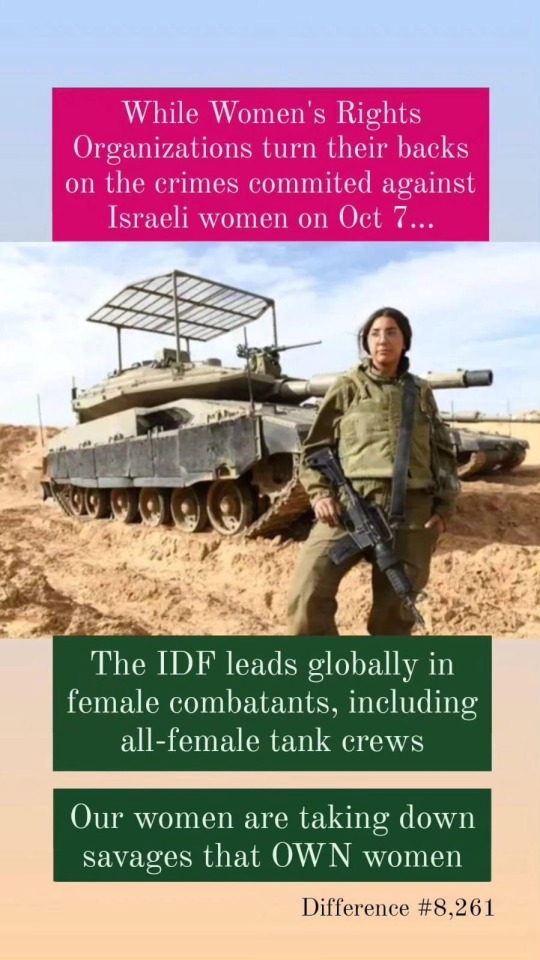
Where are all the voices? Israeli Women Matter! Silence is Complicity with evil. We are waiting..
#me too#we too#me too we too#Israeli women#Israeli lives matter#israeli#silence is violence#jewish#idf#jumblr#jewish tumblr
10 notes
·
View notes
Text
Day 1 of reasoning with the Israeli-Palestininan Conflict: Occupation Logic
Is Israel/Palestine considered Occupied Territory?
Occupied Territory, according to international law, is defined as the following: "a territory is considered “occupied” when it is actually placed under the authority of the hostile army." Additionally, the law states that it can also be the case that "occupying forces do not succeed in establishing or exercising authority over a certain territory—for instance, because of hostile acts committed against them by combatants of the occupied territory. In such cases, humanitarian law does not consider these areas as occupied territories but instead as invaded territories. In other words, they are battlefields, and the rules that apply to them are the general rules of armed conflict."
Until 2005, Gaza was regarded internationally as being occupied by Israel. On September 11, 2005, The Israeli flag has been lowered over Gaza, symbolizing the end of 38 years of Israeli occupation of the Palestinian territory two weeks ahead of schedule." However, the Israeli army still made its presence know.
The Palistinian Officials' argument, written as philosophical logic:
If Israel were to ease military restrictions, terrorism and povery would cease to be a problem in Palestinian terrority.
Israel has not eased their military restrictions.
So, terrorism and poverity will continue to flourish in the region.
This can be shortened as follows:
If A, then B.
Not A.
So, not B.
The Israeli Officials' argument, written as philosophical logic:
If terrorism were to stop, Israel would be able to cease their military restrictions.
Terrorism has not stopped.
So, Israel will not ease its restrictions.
This can be shortened as follows:
If A, then B.
Not A.
So, not B.
Simply put: both Palestinian and Israeli Officials are using the same logic to justify their actions. This form of logic that BOTH parties use is invalid (AKA not a sound argument). The basis of their argument falls under the category of Denying the Antecedent, which is a standard logical fallacy. In other words? Neither side have demonstrated justified reasoning for their actions yet (meaning, in my research so far).
Up next: I'll be reading the entire Migration Patterns document from 1948 (which was translated into English and uploaded a few years ago to the web). This 29-page paper is cited by SO many sources that I've encountered, so I want to make sure I give it a thorough read. Stay tuned!
#jumblr#logic#philosophy#philosophical arguments#israel#palestinian lives matter#israeli lives matter#jewish history#jewish#actually jewish#jewitches#denying the antecedent
3 notes
·
View notes
Text
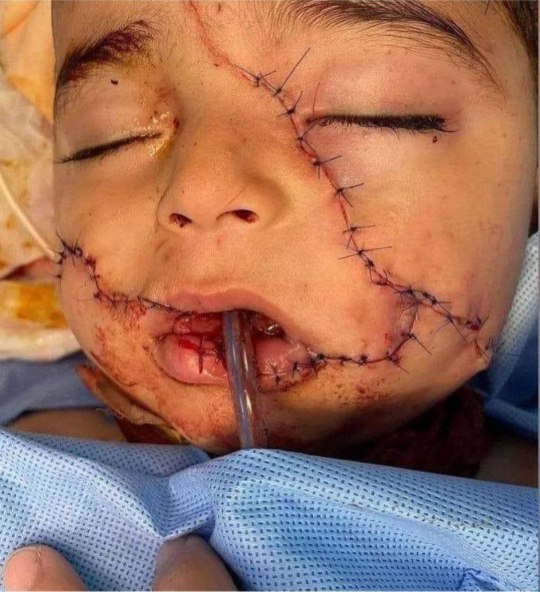
Another baby was attacked by Israel. Torturing a baby? They're monsters, I hate all Israeli genocidaires and they supporters.
Zionism is a terrorism!
STOP zionism!
#palestinian lives matter#free gaza#palestine#palestinian genocide#gaza under attack#gaza strip#free palestine#gaza#stop the genocide#this is genocide#israel is a terrorist state#israel is killing children#support palestine#palestine news#genocide#stop genocide#i stand with palestine#anti zionisim#save palestine#save the children#israeli terrorism
9K notes
·
View notes
Text
Boycott Israeli Dates this Ramadan, from Call 2 Action Now, 28/Feb/2024: (caption under images)

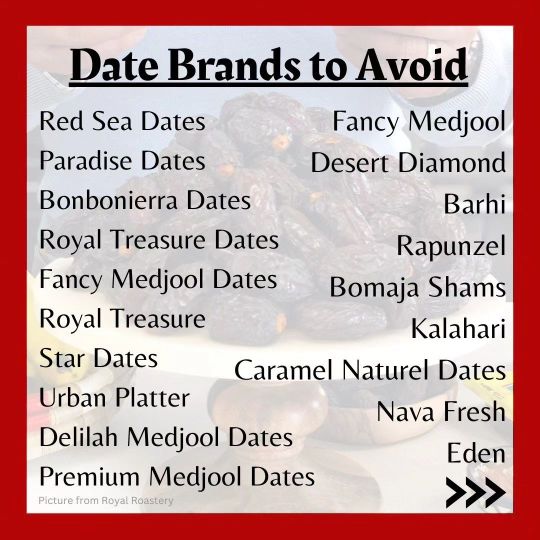

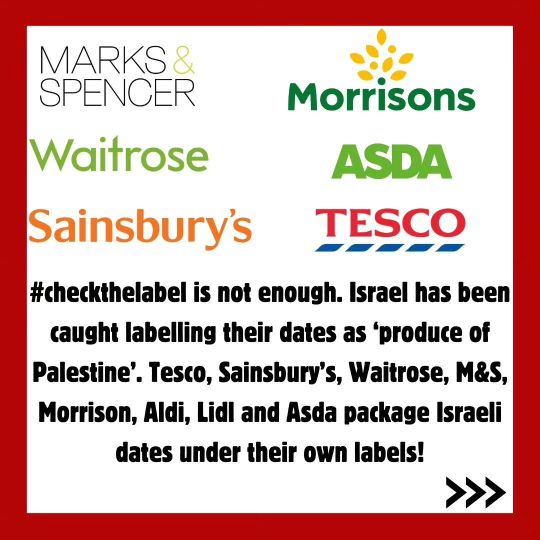

This Ramadan, don’t break your fast with an Israeli date. Stand in solidarity with the Palestinian people.
Israel’s genocidal assault on Palestinians in the Gaza Strip has now killed tens of thousands. Palestinians, facing down Israel’s catastrophic violence, call on us to boycott Israeli products in solidarity with their struggle for freedom.
Follow this quick guide to boycotting Israeli dates:
• Always check the label when buying dates. Don’t buy dates that are produced or packaged in Israel or its West Bank settlements. If no country of origin can be found on the box, check the retailer’s website.
• One of Israel’s largest exporters is called Hadiklaim. It sells dates in supermarkets under these names: King Solomon, Jordan River and Jordan River Bio-Top, as well as under the labels of supermarket chains. Check the box carefully, if the dates were “exported by Hadiklaim” – don’t buy them.
• Avoid these companies: Mehadrin, MTex, Edom, Carmel Agrexco, and Arava
#checkthelabel is not enough. Israel has been caught labelling their dates as ‘produce of Palestine’. Tesco, Sainsbury’s, Waitrose, M&S, Morrison, Aldi, Lidl and Asda package Israeli dates under their own labels!
Buy dates from Zaytoun, Alard, Yaffa, and Holy Land Date all support Palestinian Farmers. If you cannot get hold of these brands then buy dates from Tunisia, Saudi Arabia, Iran, Pakistan, UAE and Algeria.
#ramadan#muslim#ramadhan#palestine#free palestine#gaza#free gaza#from the river to the sea palestine will be free#i stand with palestine#rafah#save rafah#palestinian lives matter#boycott israeli products#boycott israel#defund israel
13K notes
·
View notes
Text


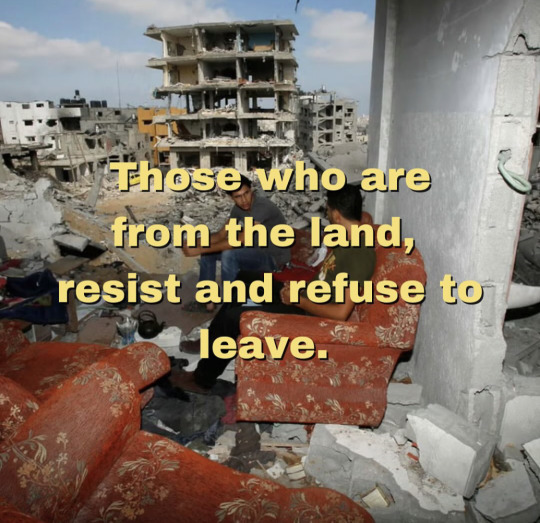
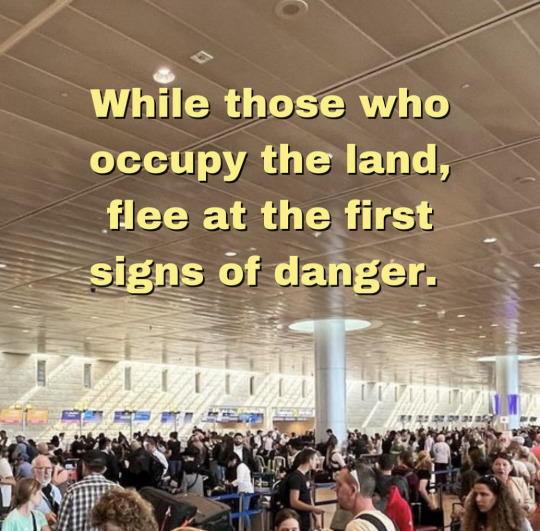
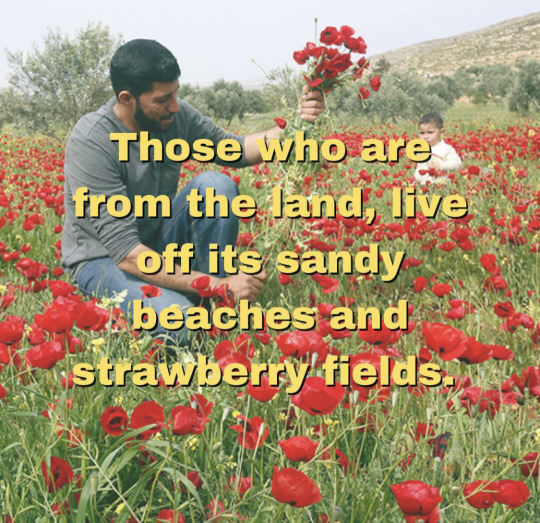
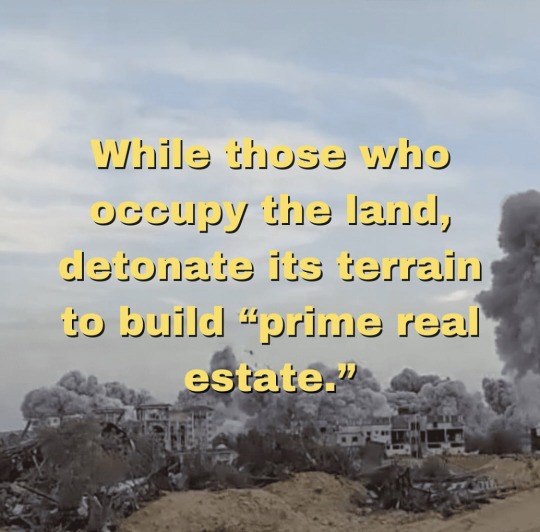

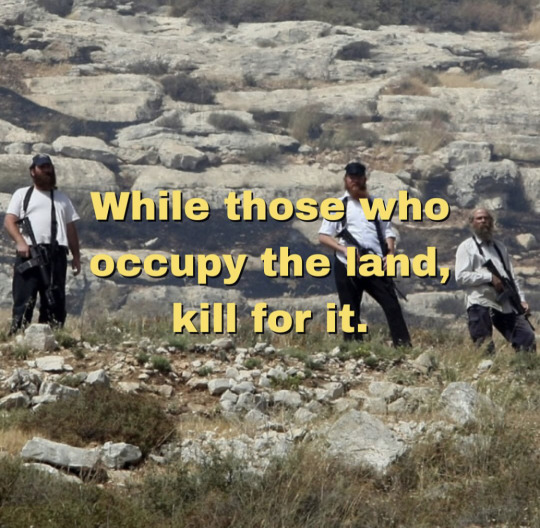
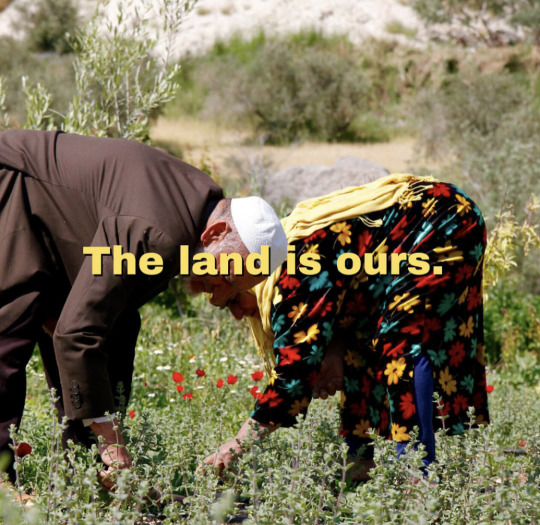
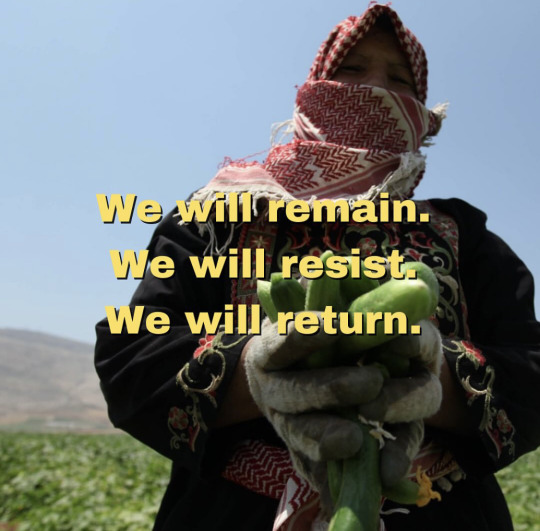
The land is ours
#free palestine#palestine#gaza#occupied palestine#israel#fuck israel#israel is an illegal occupier#stop occupation#palestine lives matter#from the river to the sea palestine will be free#protect palestine#justice for palestine#palestine will be free#israeli occupation forces#zionsim is terrorism#don't stop talking about palestine#do not steal#end the occupation#occupation#freepalastine🇵🇸
4K notes
·
View notes
Text
Yasmin Porat, a survivor of the bloodshed at Kibbutz Be’eri, near the boundary with Gaza, says many Israeli civilians were killed by Israeli forces.
An Israeli woman who survived the Hamas assault on settlements near the Gaza boundary on 7 October says Israeli civilians were “undoubtedly” killed by their own security forces.
It happened when Israeli forces engaged in fierce gun battles with Palestinian fighters in Kibbutz Be’eri and fired indiscriminately at both the fighters and their Israeli prisoners.
“They eliminated everyone, including the hostages,” she told Israeli radio. “There was very, very heavy crossfire” and even tank shelling.
The woman, 44-year-old mother of three Yasmin Porat, said that prior to that, she and other civilians had been held by the Palestinians for several hours and treated “humanely.” She had fled the nearby “Nova” rave.
A recording of her interview, from the radio program Haboker Hazeh (“This Morning”) hosted by Aryeh Golan on state broadcaster Kan, has been circulating on social media.
Notably, the interview is not included in the online version of Haboker Hazeh for 15 October, the episode in which it apparently aired.
It may well have been censored due to its explosive nature.
Porat, who is from Kabri, a settlement near the Lebanese border, undoubtedly experienced terrible things and saw many noncombatants killed. Her own partner, Tal Katz, is among the dead.
However, her account undermines Israel’s official story of deliberate, wanton murder by the Palestinian fighters.
Although it no longer appears on the Kan website, there can be little doubt about the recording’s authenticity.
At least one Hebrew-language account posted part of the interview on Twitter, now officially called X, and accused Kan of functioning as “media in the service of Hamas.”
Porat also gave her account to the Israeli newspaper Maariv.
However, the Maariv story, published on 9 October, makes no specific mention of civilians being killed by Israeli forces.
And in a half-hour interview with Israel’s Channel 12 on Thursday, Porat speaks of intense gunfire after Israeli forces arrived. Porat herself received a bullet in the thigh.
Not only does Porat tell Kan that Israelis were killed in the heavy counterattack by Israeli security forces, but she says she and other captive civilians were well treated by the Palestinian fighters.
Porat had been attending the “Nova” rave when the Hamas assault began with missiles and motorized paragliders. She and her partner Tal Katz escaped by car to nearby Kibbutz Be’eri where many of the events she describes in her media interviews took place.
According to Porat speaking to Maariv, she and Katz initially sought refuge in the house of a couple called Adi and Hadas Dagan. After the Palestinian fighters found them they were all taken to another house, where eight people were already being held captive and one person was dead.
Porat said that the wife of the dead man “told us that when they [the Hamas fighters] tried to enter, the guy tried to prevent them from entering and grabbed the door. They shot at the door and he was killed. They did not execute them.”
“They did not abuse us. They treated us very humanely,” Porat explained to a surprised Golan in the Kan radio interview.
“By that I mean they guard us,” she said. “They give us something to drink here and there. When they see we are nervous they calm us down. It was very frightening but no one treated us violently. Luckily nothing happened to me like what I heard in the media.”
“They were very humane towards us,” Porat said in her Channel 12 interview. She recalled that one Palestinian fighter who spoke Hebrew, “told me, ‘Look at me well, were not going to kill you. We want to take you to Gaza. We are not going to kill you. So be calm, you’re not going to die.’ Thats what he told me, in those words.”
“I was calm because I knew nothing would happen to me,” she added.
“They told us that we would not die, that they wanted to take us to Gaza and that the next day they would return us to the border,” Porat told Maariv.
In the Channel 12 interview, Porat elaborates that although the Palestinian fighters all had loaded weapons, she never saw them shoot captives or threaten them with their guns.
In addition to providing the captives with drinking water, she said the fighters let them go outside to the lawn because it was hot, especially as the electricity was cut.
#journalism is dead#israel lies#israel is an apartheid state#israel is a terrorist state#jews against israel#ethnic cleansing#apartheid#gazaunderfire#gaza under attack#save palestine#stop killing children#stop israel#propaganda kills#genocide#palestinian lives matter#boycott israel#bds#israeli war crimes#friendly fire#icc war crimes tribunal
2K notes
·
View notes
Text
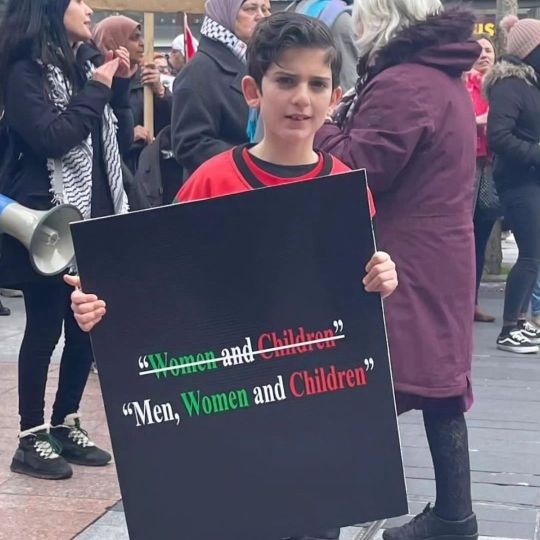
All Palestinian Lives Matter
#palestinian lives matter#gaza#all eyes on rafah#rafah under attack#rafah#gaza under attack#israel#free palestine#palestine#jerusalem#i stand with palestine#فلسطين#free gaza#israel is a terrorist state#israeli war crimes
1K notes
·
View notes
Text
For anyone about to call this man antisemitic for supporting Israel, 1. He’s Jewish 2. He’s a Secular Jew and not a Religious one which means he’s more of a Jew than 45% of the RELIGIOUS ETHNO STATE.
#gaza strip#palestine#israel#from the river to the sea palestine will be free#gaza#gaza genocide#news on gaza#free gaza#gazaunderattack#save gaza#am yisrael chai#free israel#i stand with israel#jumblr#jewblr#israeli lives matter
8 notes
·
View notes
Text
Happy Passover Today
youtube
To those who are super anti-Israel and supporting enemies of the Jews. Let's just say plagues are an option for those who want to get on Yahweh's bad side. And again to Hamas and Palestine, let Israel's people go.
#israel#pro-israel#passover#israeli lives matter#jewish lives matter#israel solidarity#prince of egypt#source: prince of eygpt#youtube#let my people go#pro-jewish#Youtube
5 notes
·
View notes
Text
This is the reality.
7 notes
·
View notes
Text
BOYCOTT MCDONALD'S

#sionistes#sionisme#boycott israel#boycott#boycott mcdonalds#israeli war crimes#israeli occupation#israeli apartheid#israel is a terrorist state#israel is an apartheid state#genocide in palestine#genocide in gaza#support palestine#palestinians#palestinian lives matter#free palestine#palestine#stand with palestine#palestinian genocide#gaza genocide#free gaza#stand with gaza#gaza#war criminals#war crimes#crimes against humanity#crimes de guerre#i stand with palestine#occupation#israel occupation
983 notes
·
View notes
Text
I don’t usually talk about politics on here, if ever. But it’s been almost six months since the conflict in the Middle East flared up again, and I’m finally ready to start. Here are some of my thoughts.
I say ‘flared up’ because this has happened before and it’ll happen again. Because, even though what's currently going on is absolutely unprecedented, those of us who live in this part of the world are used to it. Let that sink in: we are used to this. And we shouldn’t have to be.
But I use that term for another reason: I don't want to accidentally call it the wrong thing lest I come under fire for being a genocidal maniac or a terrorist or a propaganda machine, etc., etc.—so let’s just call it ‘the war’ or ‘the conflict.’ Because that’s what it is. Doesn’t matter which side you’re on, who you love, or who you hate.
This post will, in all likelihood, sit in my drafts forever. If it does get posted, it certainly won’t be on my main, because I'm scared of being harassed (spoiler: she posted it on her main). I hate admitting that, but honestly? I’m fucking terrified.
I also feel like in order for anything I say on here (i.e. the hellscape of the internet) to be taken seriously, I have to somehow prove that a) I’m “educated” enough to talk about the conflict, and b) that my opinion lines up with what has been deemed the correct one. So, tedious and unnecessary though it is, I will tell you about my experience, because I have a feeling most of the people reading this post are not nearly as close to what’s happening as I am.
How do I explain where I live without actually explaining where I live? How do I say “I live in the Red Zone of international conflicts” without saying what I actually think? How do I convey the fear that grips me when I try to decide between saying “I live in Palestine” and “I live in Israel”? I don't really know. But I do know that names are important. I also know that, due to the various clickbaity monikers ascribed to the conflict, it would probably just be easier to point to a map.
I haven't always lived in the Middle East. I've lived in various places along America’s east coast, and traveled all over the world. But in short, I now live somewhere inside the crudely-drawn purple circle.
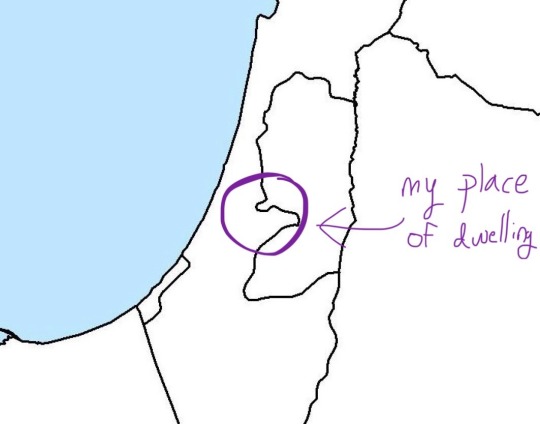
If you know anything about these borders you probably blanched a bit in sympathy, or maybe condolence. But in truth, it’s a shockingly normal existence. I don't feel like I've lived through the shifting of international relations or a war or anything. I just kind of feel like I did when COVID hit, that dull sameness as I wondered if this would be the only world-altering event to shape my life, or if there would be more.
I've been told that, in order for my brain to process all the horrific details of the past six months, there needs to be some element of cognitive dissonance—that falling into a sort of dissociative mindset is the only way to not go insane under the weight of it all. I think in some ways that’s true. I have been terrifyingly close to bus stop shootings when my commute wasn’t over; I have felt my apartment building shake with the reverberations of a missile strike; I have spent hours in underground shelters waiting for air raid sirens to stop.
But. I have also gone grocery shopping, and skipped class, and stayed up too late watching TV, and fed the cats on the street corner, and cried over a boy, and got myself AirPods just because, and taken out the trash, and done laundry on a delicate cycle, and bought overpriced lattes one too many days a week. I have looked at pretty things and taken out my phone because, despite it all, I still think that life is too short not to freeze the small moments.
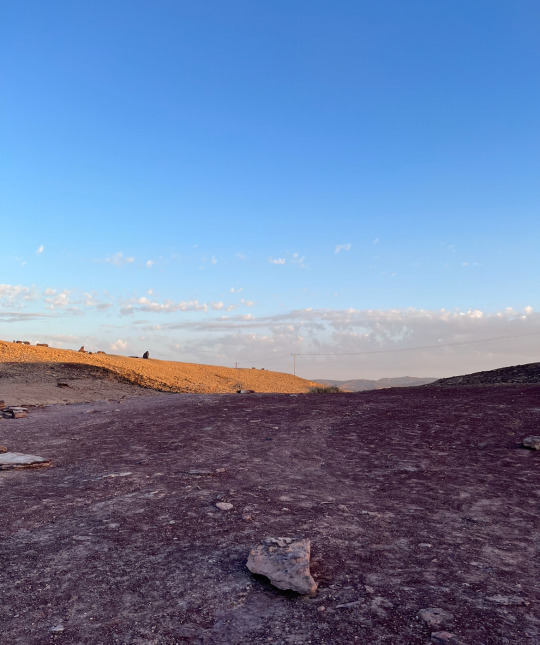
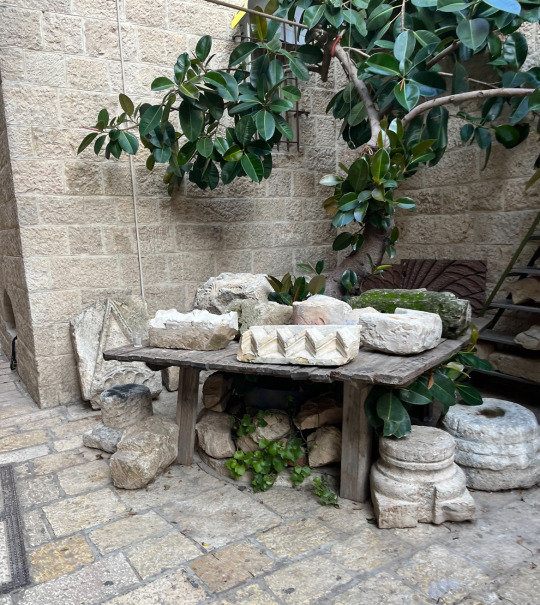
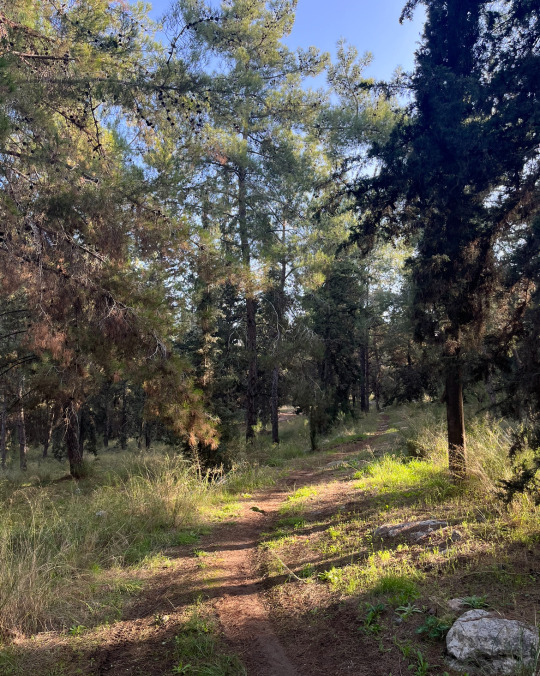
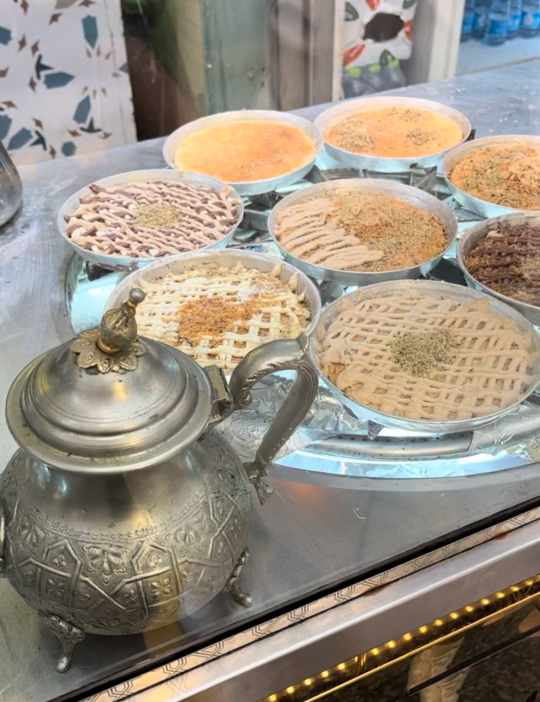
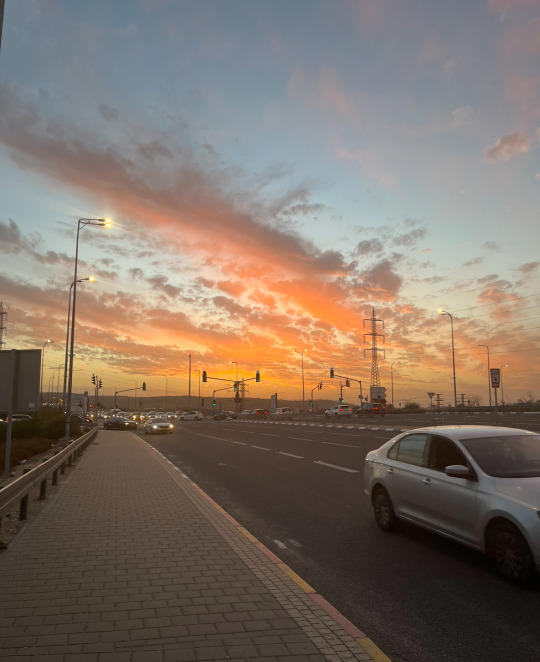
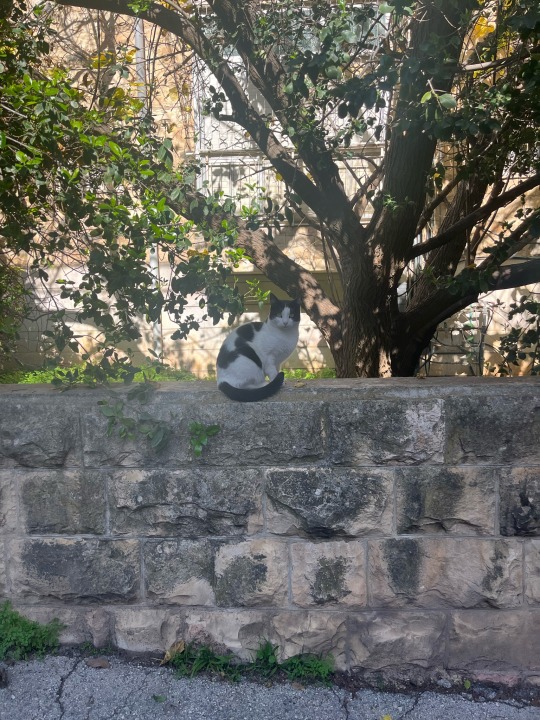
So I'd say, all things considered, I live an incredibly privileged life—compared, of course, to those suffering in Gaza—one filled with sunsets and over-sweetened knafeh and every different color of sand. One that allows me to throw myself into a fandom-induced hyperfixation (or, alternatively, escape method) as I sit on the couch and crack open my laptop to write the next chapter of the fic I'm working on.
But there are bits of not-normalness that wheedle their way through the cracks. I pretend these moments are avoidable, even if they’re not.
They look like this: reading the news and seeing another idiotic, careless choice on Netanyahu’s part and groaning into my morning coffee. Watching Palestinian and Jewish children’s needless suffering posted on Instagram reels and feeling helpless. Opening my Tumblr DMs to find a message telling me to exterminate myself for reblogging a post that only seems like it’s about the war if you squint and tilt your head sideways.
These moments look like all the tiny ways I am reminded that I'm living in a post-October seventh world, where hearing a car backfire makes me jump out of my skin and the sound of a suitcase on pavement makes me look up at the sky and search for the war planes. They look like the heavy grief that is, and also isn’t, mine.
Here's the thing, though. I know you’re wondering when the ball will drop and my true opinion will be revealed. I know you’re waiting for me to reveal what demographic I'm a part of so that you, dear reader, can neatly slap a label on my head and sort me into some oversimplified category that lets you continue to think you understand this war.
No one wants to sit and ruminate on the difficult questions, the ones that make you wonder if maybe you’ve been tinkered with by the propaganda machine, if you might need to go back on what you’ve said or change your mind. We all strive for our perception of complicated issues to be a comfortable one.
But I know that no matter what I do, there will always be assumptions. So, while I shudder to reveal this information online, I think that maybe my most significant contribution to this meta-discussion spanning every facet of the internet is this:
I am a Jew.
Or, alternatively, I am: Jewish, יהודית, يَهُودِيٌّ, etc. Point is, I come from Jews. And, like any given person, I am a product of generation after generation of love.
I'm not going to take time to explain my heritage to you, or to prove that before all the expulsions and pogroms, there was an origin point. If you don’t believe that, perhaps it’s less of a factual problem and more of an ‘I don’t give weight to the beliefs of indigenous people’ problem. But, in case you want to spend time uselessly refuting this tiny point in a larger argument, you can inspect the photos below (it’s just a small chunk of my DNA test results). Alternatively, you can remember that interrogating someone in an attempt to make their indigeneity match your arbitrary criteria is generally not seen as good manners.
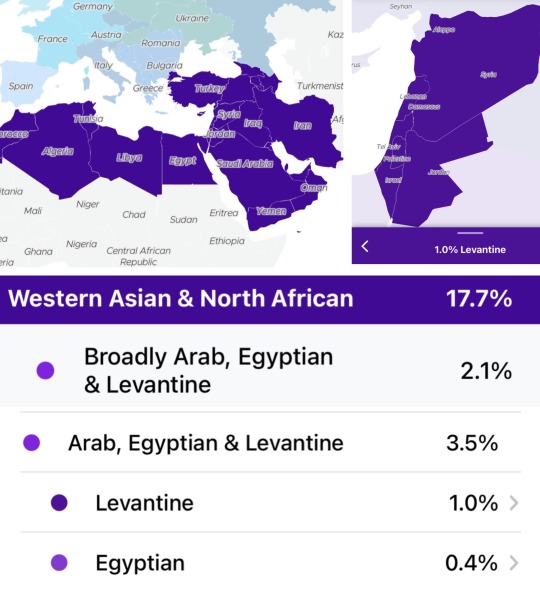
Now, let’s go back to thathateful message (read: poorly disguised death threat) I received in my Tumblr DMs. I think it was like two or three weeks ago. I had recently gained a new follower whose blog’s primary focus was the fandom I contribute to, so I followed them back. I saw in my notes that they were going through my posts and liking them—as one does when gaining a new mutual. Yippee!
Then they sent me this:
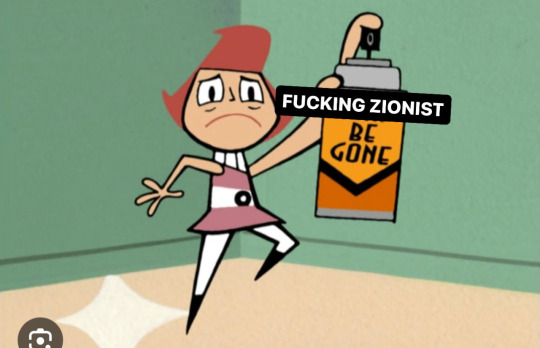
I tried to explain that hate speech is not a way to go about participating in political discourse, but the person had already blocked me immediately after sending that message. Then, assured by the fact that I surely would never see them complaining about me on their blog (because, as I said, they blocked me), they posted a shouting rant accusing me of sympathizing with colonizing settlers and declaring me a “racist Zionist fuck.” Oh, the wonders of incognito tabs.
Where this person drew these conclusions after reading my (reblogged) post about antisemitism…. I'm not actually sure. But I greatly sympathize with them, and hope that they weren’t too personally offended by my desire to not die.
For a while I contemplated this experience in my righteous anger, and tried to figure out a way to message this person. I wanted to explain that a) seeing a post about being Jewish and choosing to harass the creator about Israel is literally the definition of antisemitism and b) that sending a hateful DM and refusing to be held accountable is just childish and immature. But I gave up soon after—because, honestly, I knew it wasn’t worth my effort or energy. And I knew that I wouldn't be able to change their mind.
But I still remember staring at that rather unfortunate meme, accompanied by an all-caps message demanding for me to Free Palestine, and thinking: the post didn’t even have any buzzwords. I remember the swoop of dread and guilt and fear. I remember wondering why this kind of antisemitism felt worse, in that moment, than the kind that leaves bodies in its wake.
I remember thinking, I don’t have the power to free anyone.
I remember thinking, I’m so fucking tired.
And before you tell me that this conflict isn’t about religion—let me ask you some questions. Why is it that Israel is even called Israel? (Here’s why.) Why do Jews even want it? (Here’s why.) But also, if you actually read the charters of Islamist terrorist organizations like ISIS, Hamas, and Hezbollah (among others), they equate the modern state of Israel with the Jewish people, and they use the two entities interchangeably. So of course this conflict is religious. It’s never been anything but that.
But I do wonder, when faced with those who deny this fact: how do I prove, through an endless slew of what-about-isms and victim blaming, that I too am hurting? How do I show that empathy is dialectical, that I can care deeply for Palestinians and Gazans while also grieving my own people?
There's this thing that humans do, when we’re frustrated about politics and need to howl our opinions about it into the void until we feel better. We find like-minded souls, usually our friends and neighbors, and fret about the state of the world to each other until we’ve gone around in a satisfactory amount of circles. But these conversations never truly accomplish anything. They’re just a substitute, a stand-in catharsis, for what we really wish we could do: find someone who embodies the spirit of every Jew-hating internet troll, every ignorant justifier of terrorism, and scream ourselves hoarse at them until we change their mind.
But, of course, minds cannot be changed when they are determined to live in a state of irrational dislike. In Judaism, this way of thinking has a name: שנאת חינם (sinat hinam), or baseless hatred. It's a parasite with no definite cure, and it makes people bend over backwards to justify things like the massacre on October seventh, simply because the blame always needs to be placed on the Jews.
So when a Jew is faced with this unsolvable problem, there is only one response to be had, only one feeling to be felt: anger. And we are angry. Carrying around rage with nowhere to put it is exhausting. It's like a weight at the base of our neck that pushes down on our spine, bending it until we will inevitably snap under the pressure. I’m still waiting to break, even now.
I wish I could explain to someone who needs to hear it that terrorism against Israelis happens every single day here, and that we are never more than one degree of separation away from the brutal slaughter of a friend, lover, parent, sibling. I wish it would be enough to say that the majority of Israelis (which includes Arab-Israeli citizens who have the exact same rights as Jewish-Israelis) wish for peace every day without ever having seen what it looks like.
I wish I could show the world that Israel was founded as a socialist state, that it was built on communal values and born from a cluster of kibbutzim (small farming communities based on collective responsibility), and that what it is now isn’t what its people stand for.
I wish the world could open their eyes to what we Israelis have seen since the beginning: that Hamas is the enemy, Hamas is the one starving Palestinians and denying them aid, Hamas is the one who keeps rejecting ceasefire terms and denying their citizens basic human rights. Hamas is the governing body of Gaza, not Israel. Hamas is responsible for the wellbeing of the Palestinian people. And Hamas are the ones who are more determined to murder Jews—over and over and over again, in the most animalistic ways possible—than to look inwards and see the suffering they’ve inflicted on their own people. I wish it was easier to see that.
But the wishing, the asking how can people be so blind, is never enough. I can never just say, I promise I don't want war.
When I bear witness to this baseless hatred, I think of the victims of October seventh. I think of the women and girls who were raped and then murdered, forever unable to tell their stories. I think of the hostages, trapped underneath Gaza in dark tunnels, wondering if anyone will come for them. I think of Ori Ansbacher, of Ezra Schwartz, of Eyal, Gilad, and Naftali, of Lucy, Rina, and Maia Dee, of the Paley boys, of Ari Fuld and of Nachshon Wachsman. I think of all the innocent blood spilled because of terror-fueled hatred and the virus of antisemitism. I think of all the thousands of people who were brutally murdered in Israel, Jews and Muslims and Christians and humans, who will never see peace.
My ties to this land are knotted a thousand times over. Even when I leave, a part of me is left behind, waiting for me to claim it when I return. But when I see the grit it takes to live through this pain, when I see the suffering that paints the world the color of blood, I look to the heavens and I wonder why.
I ask God: is it worth all this? He doesn't answer. So I am the one, in the end, to answer my own question. I say, it has to be.
Feel free to send any genuine, respectful, and clarifying questions you may have to my inbox!
EDIT: just coming on here to say that I'm really touched & grateful for the love on this post. When I wrote it, I felt hopeless; I logged off of Tumblr for Shabbat, dreading the moment I would turn off my phone to find more hate in my inbox. Granted, I did find some, and responding to it was exhausting, but it wasn’t all hate. I read every kind reblog and comment, and the love was so much louder. Thank you, thank you, thank you. 🤍
Source Reading
The Whispered in Gaza Project by The Center for Peace Communications
Why Jews Cannot Stop Shaking Right Now by Dara Horn
Hamas Kidnapped My Father for Refusing to Be Their Puppet by Ala Mohammed Mushtaha
I Hope Someone Somewhere Is Being Kind to My Boy by Rachel Goldberg
The Struggle for Black Freedom Has Nothing to Do with Israel by Coleman Hughes
Israel Can Defend Itself and Uphold Its Values by The New York Times Editorial Board
There Is a Jewish Hope for Palestinian Liberation. It Must Survive by Peter Beinart
The Long Wait of the Hostages’ Families by Ruth Margalit
“By Any Means Necessary”: Hamas, Iran, and the Left by Armin Navabi
When People Tell You Who They Are, Believe Them by Bari Weiss
Hunger in Gaza: Blame Hamas, Not Israel by Yvette Miller
Benjamin Netanyahu Is Israel’s Worst Prime Minister Ever by Anshel Pfeffer
What Palestinians Really Think of Hamas by Amaney A. Jamal and Michael Robbins
The Decolonization Narrative Is Dangerous and False by Simon Sebag Montefiore
Understanding Hamas’s Genocidal Ideology by Bruce Hoffman
The Wisdom of Hamas by Matti Friedman
How the UN Discriminates Against Israel by Dina Rovner
This Muslim Israeli Woman Is the Future of the Middle East by The Free Press
Why Are Feminists Silent on Rape and Murder? by Bari Weiss
#palestine#israel hamas war#israel hamas conflict#hamas#on war#essay writing#personal essay#rant post#stop terrorism#israel#writing#palestinian lives matter#jewish lives matter#jewish and proud#jewish identity#jewish muslim solidarity#on grief#on religion#antisemitism#anti zionisim#purim 2024#chag purim sameach#judaism#israeli palestinian conflict#am yisrael chai#kvetching#jumblr#mims on middle east#המצב
540 notes
·
View notes
Text
When Great Britain occupied Palestine, they raised villages to the ground from which terrorist came from, I wish Israel be more proactive and do the same.
1 note
·
View note
Text

#free palestine#palestine#gaza#occupied palestine#free gaza#palestine will be free#gaza strip#justice for palestine#from the river to the sea palestine will be free#protect palestine#palestine lives matter#fuck israel#israel#resistance hamas#hamas resistance#hamas#humans rights#israel is not the victim#zionsim is terrorism#anti zionisim#all eyes on palestine#israel has no right to exist#israeli occupation forces#we deserve better
442 notes
·
View notes